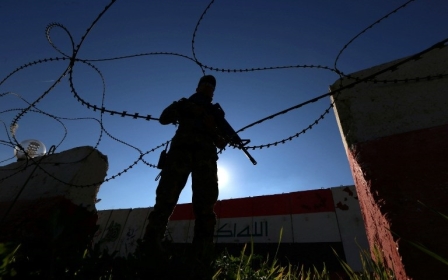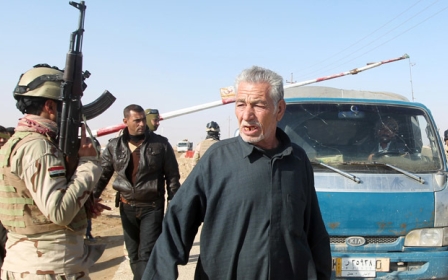Fallujah civilians 'trapped and starving' as Iraq army besieges IS

The people of Fallujah are trapped and starving as the Iraqi army and the Islamic State group vie for control of the town, a rights group has said.
Human Rights Watch called on Thursday for Iraq to allow aid to reach starving residents of the city, and for the Islamic State group to allow civilians to leave.
"The people of Fallujah are besieged by the government, trapped by (IS), and are starving," said HRW's deputy Middle East director, Joe Stork.
"The warring parties should make sure that aid reaches the civilian population."
HRW cited Iraqi activists who are in contact with Fallujah residents as saying that people "were reduced to eating flat bread made with flour from ground date seeds and soups made from grass".
The city, which is now home to about 50,000 people, has been under siege by the Iraqi army since early 2014 when IS seized the city - making it the first Iraqi town to fall to the militants.
"Providing daily meals for our families has become a great achievement for all of us," Hameed, a resident told Middle East Eye by phone from the besieged city.
"I do not care if they [the IS fighters] killed me or not, I have to get food for my family," he added.
Anti-government fighters took control of Fallujah, just 50km west of Baghdad, in early 2014 during unrest that broke out after security forces demolished a protest camp further west, and it later became an IS stronghold.
IS seized more territory in surrounding Anbar province after launching an offensive later that year, but pro-government forces have since regained significant ground from IS.
Iraqi forces have largely cut off access to Fallujah, while IS is preventing residents from leaving the city.
Tribesmen battled IS in Fallujah for several days in February in a sign that its grip was weakening, but the fighting ended after the militants detained dozens of residents.
IS has also announced the execution of alleged "spies" in the city.
With the most vulnerable already dying and medical supplies growing scarcer by the day, fears are growing that things are set to get much worse.
"The humanitarian situation in Fallujah is very bad,” Essa Sayeer al-Essawie, the mayor of Fallujah, told MEE.
“People cannot find anything to eat. The prices are very high and there is no food, no milk, and no medicine. Nothing has been allowed to get into the city for months.
"The city is under the control of Daesh [IS] and is surrounded by the army, so nothing can get in. Aid groups want to send in food but they will not do as long as there are military operations," he added.
New MEE newsletter: Jerusalem Dispatch
Sign up to get the latest insights and analysis on Israel-Palestine, alongside Turkey Unpacked and other MEE newsletters
Middle East Eye delivers independent and unrivalled coverage and analysis of the Middle East, North Africa and beyond. To learn more about republishing this content and the associated fees, please fill out this form. More about MEE can be found here.




